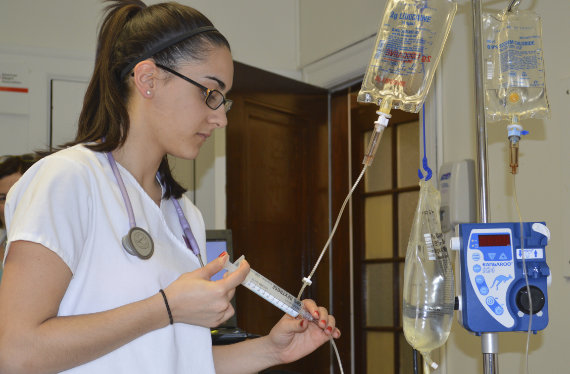If you're a veteran looking to pursue a nursing career in civilian life, you know that this is not a cost-effective endeavor. Even with the numerous military benefits offered to you for furthering your education, many times this aid is not enough. Fortunately, there are other forms of financial assistance you may be eligible to receive, the most important one being scholarships. This article covers a list of scholarships available to veterans who need additional financial assistance when pursuing their nursing degree.
Please note that this article focuses on scholarships and financial aid available to veterans. If you have retired from active duty these scholarships can provide additional resources for covering your college expenses. If you have not served in the armed forces, but are considering doing so, programs such as ROTC can be an excellent way to cover the cost of your degree.
Financial Aid Available
Before seeking out scholarships, it is important to review the benefits you may already be entitled to. It is possible that, depending on how long you have served and what school you are attending, your tuition expenses are entirely covered through the following programs/veteran benefits:
- Post-9/11 GI Bill®: The Post-9/11 GI Bill® is perhaps the most popular benefit to pay for college tuition. If you qualify for complete coverage, the bill pays for 100% of your tuition, as well as a monthly housing and textbook stipend for public colleges and universities. For private institutions, the GI Bill® covers up to a certain amount per academic year (this number varies annually).
- Montgomery GI Bill® (Active Duty): The Montgomery GI Bill® Active Duty (MGIB-AD) can help active duty service members or veterans cover the cost of education and training programs. While the eligibility requirements for the MGIB-AD are stricter than the Post-9/11 GI Bill®, you may be entitled to benefits if you have served for at least two consecutive years in the armed forces.
- Yellow Ribbon Program: If full GI Bill® benefits are not sufficient to cover the cost of tuition, the Yellow Ribbon Program may be able to help with the difference. This program is a voluntary partnership between private institutions and Veterans Affairs (VA) to help cover some or all of the tuition costs that the GI Bill® doesn't cover.
It is important to start by determining which options you are already eligible for, as most military scholarships require that you have exhausted all other financial benefits before receiving any additional financial support.
How to Seek Out Scholarships
Though this list covers six potential scholarships you can apply for, it is not a fully comprehensive list. There are many scholarships available for veterans that you may be able to apply for regardless of the degree program you are pursuing. Here are some ways that you can begin to look for scholarships:
- Review Your College's Website: Colleges will sometimes list some of the scholarships available to Veterans somewhere on their website. Reviewing this page is an excellent place to start when deciding what scholarships to apply for.
- Reach Out to College Faculty: Chances are, whichever school you are applying to they are able to support you in your search for scholarships. Career services or academic advising are great resources that may be able to help you find scholarships applicable to you.
- Develop Your Professional Network: Develop your professional network while in college. This might include faculty members, teachers, nurses during your clinicals, peers in your program, etc. College is an incredible time to develop your network and these connections are often the best resource in your search for benefits.
- Search the Internet: At the end of the day, scouring the internet is a great way to seek out scholarships that you can apply for. Sources such as Unigo or Fastweb can supply you with a variety of scholarships that can help you fund your education in the medical field.
With this in mind, here is a list of six scholarships you may be able to apply for as a veteran pursuing a degree in nursing.
Nursing Scholarships for Veterans
1. Health Professional Scholarship Program (HPSP) Nursing Scholarship (BSN only)
The HPSP (BSN) is intended to provide financial assistance for students pursuing an undergraduate degree in nursing. Each recipient of this scholarship is required to work at a VA healthcare facility for at least 2.5 years following graduation in order to alleviate the medical care workforce shortages in the VA. Students will also be required to pass their licensure or certification and complete a 12 month Post Baccalaureate Nursing Residency (PBNR). The scholarship covers full tuition, required fees, and other educational expenses such as textbooks.
While this scholarship is available to both civilian and veteran applicants, veterans are given first preference among equally qualified applicants. In order to keep this scholarship active, students must maintain a cumulative GPA of 3.0 or higher in their studies.
2. HPSP Nursing Scholarship MSN Mental Health Nurse Practitioner
The HPSP (MSN) scholarship is similar to the BSN scholarship, but requires that the applicants complete an advanced degree in nursing with a specialization as a mental health nurse practitioner. This scholarship also requires each recipient to serve at a VA healthcare center for 2.5 years following graduation, as well as requiring that each student complete a 12 month psychiatric mental health NP residency.
Once again, this scholarship is available to both civilian and veteran applicants, but veterans are given first preference. This scholarship also requires that students maintain at least a 3.0 GPA.
3. Health Professional Scholarship Program (HPSP) Physician Assistant Scholarship
The HPSP (MSPA) scholarship is awarded to PA trainees who have veteran status. This scholarship is awarded to individuals pursuing a Master of Science in Physician Assistant Studies. As is the case with the other HPSP scholarships, recipients must serve at a VA healthcare center as a PA for at least 2.5 years and must maintain a cumulative GPA of 3.0 or higher.
4. Army Nurse Corps Association (ANCA) Scholarship
The ANCA scholarship is offering select applicants a scholarship of $3,000 to go toward their education. In order to qualify, applicants must be serving or have previously served in any branch of the U.S. Army, and cannot be receiving ROTC or 100% GI Bill® funding. Applicants must be pursuing an accredited baccalaureate, advanced nursing degree, or nurse anesthesia program. This scholarship is also available for dependents whose parent or spouse has served in the U.S. Army.
5. Tillman Scholarship
The Pat Tillman scholarship is not specific to nursing, but gives veterans another option to help fund their education. In order to apply, the applicant must either be a veteran, active duty service member, or the spouse of a veteran or active duty service member. Applicants must be enrolled full time at an accredited college or university pursuing an undergraduate or advanced degree.
6. Purple Heart Scholarship Program
If you have served and were wounded in a combat situation in the line of duty, you may be eligible to apply for the Purple Heart Scholarship Program. This scholarship is available for Purple Heart recipients who are also members of the Military Order of the Purple Heart (MOPH). The scholarship is also available to MOPH spouses and direct lineal descendants. Students must be enrolled full-time at a college or university and maintain at least a 2.75 GPA in order to apply.
Pursuing a Nursing Career?
The nursing field is both incredibly rewarding and well-paying. If you have previously served in the armed forces in a health care capacity, you may find that a career in nursing is perfect for you. This guide walks you through the process of transitioning from an army medic or navy corpsman position to a civilian nursing career.
GI Bill® is a registered trademark of the U.S. Department of Veterans Affairs (VA). More information about education benefits offered by VA is available at the official U.S. government website.





